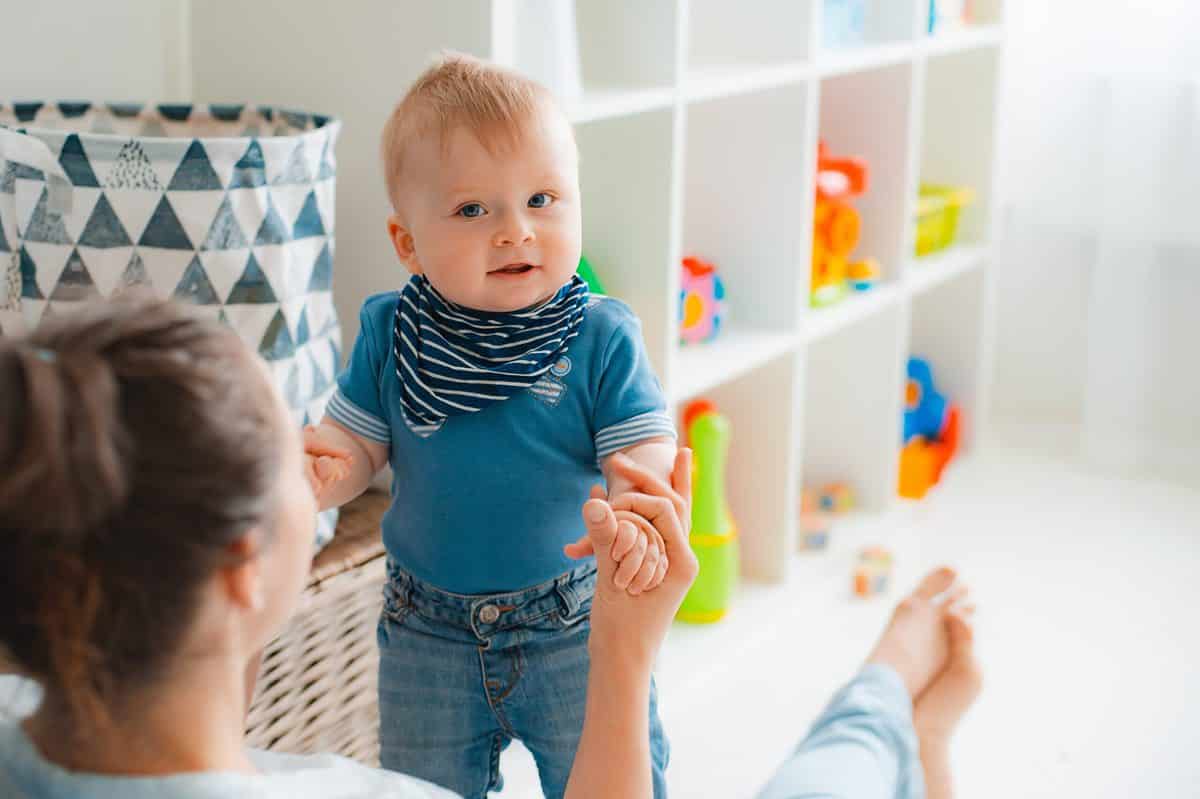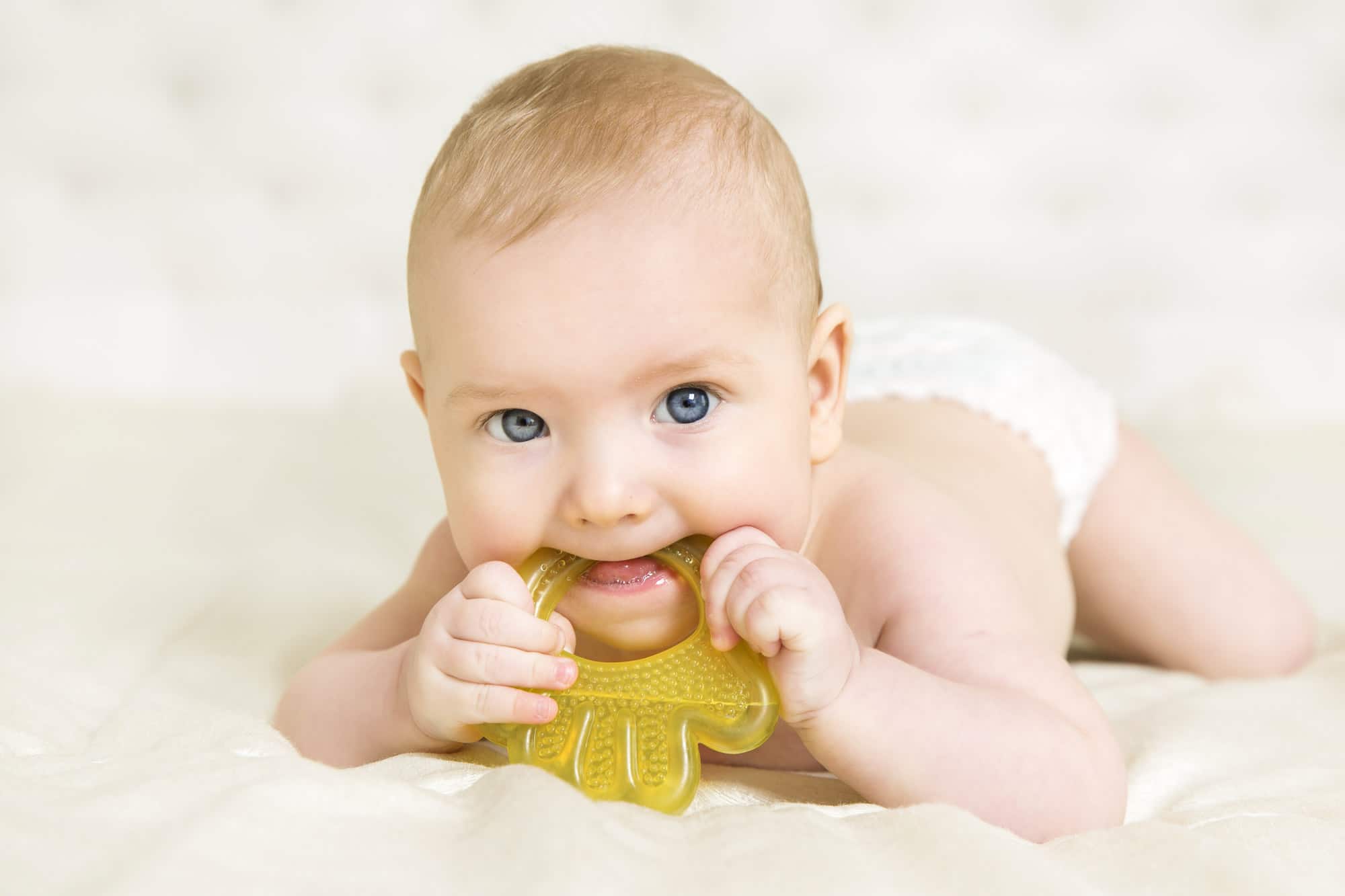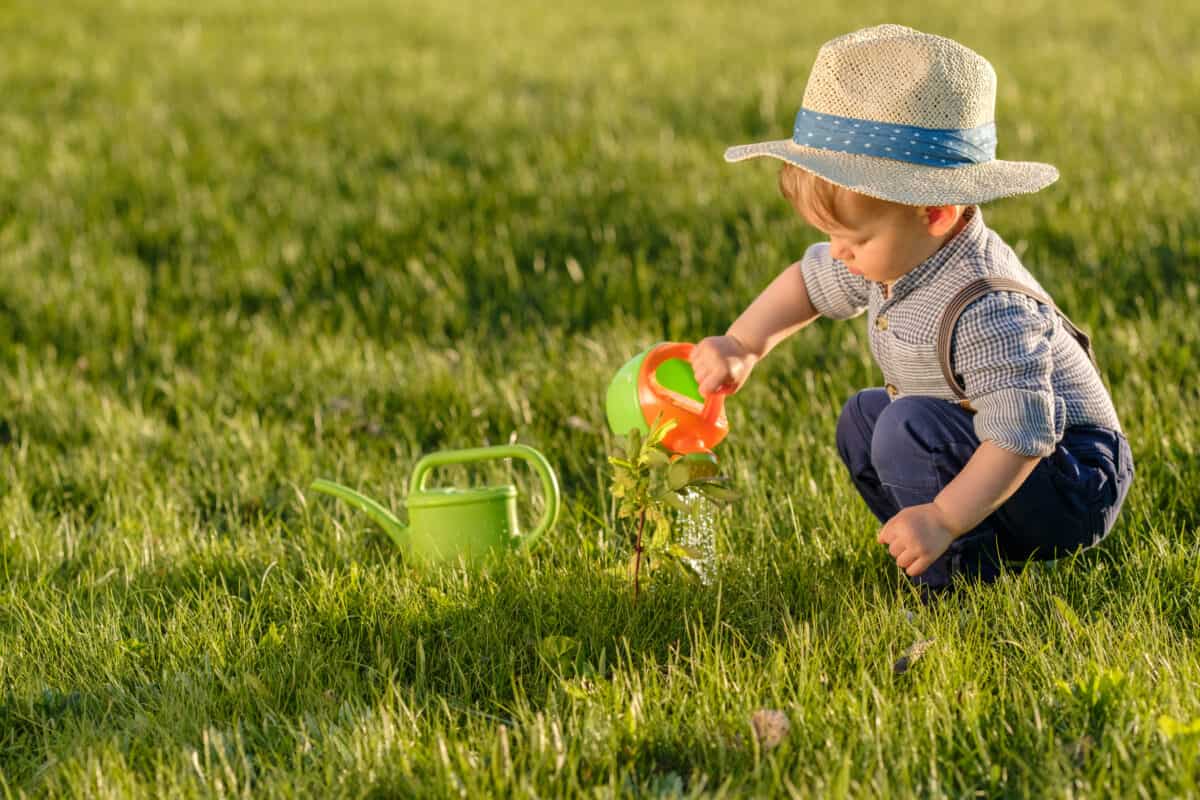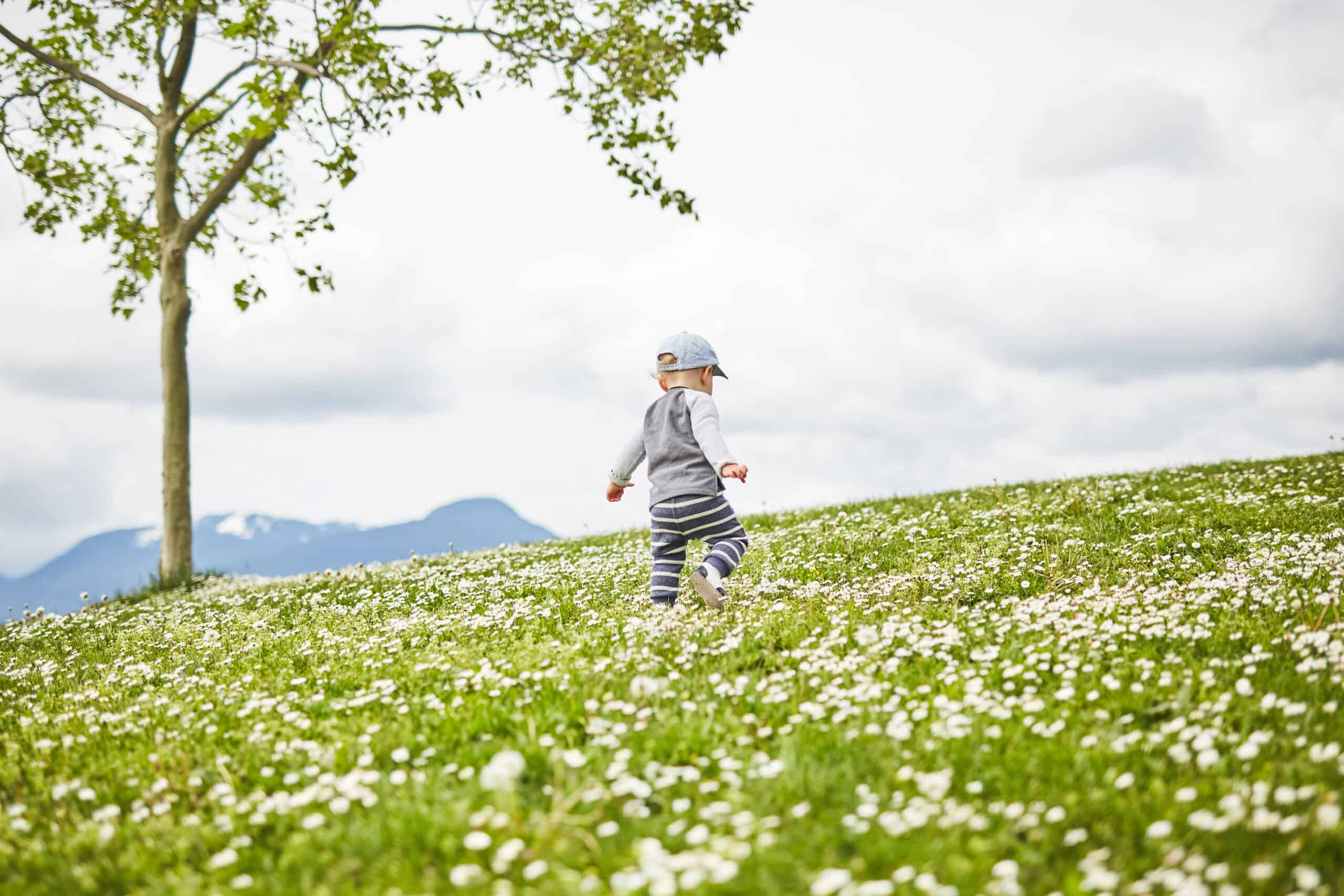Starting to get the hang of parenting a toddler, despite the fact that your child is changing by the second? We understand that there is a lot of developmental milestones at 15 months of age to keep track of. If you notice anything these days, it's that they're exploring the world around them-they're all about seeing, touching, hearing, and getting their hands in everything! You may also notice that they are becoming more emotional, which indicates that the dreaded “terrible 2” tantrums are on the way.

©Juliya Shangarey/Shutterstock.com
Your child may also, at this age:
- Obey basic commands, such as “Please sit down”
- Drink from a cup – most likely with spills! – and use a spoon
- Point to body parts, favorite toys, or people they recognize
- Handle a crayon and possibly doodle and scribble with it after you show them how
- Try to help you in getting them dressed, such as holding out their arms for sleeves or raising their feet for shoes.
Your Baby at 15 Months Old
Your baby will be getting into everything at this point! Expect them to toddle around and climb on furniture (and potentially even out of the crib!) independently or still cruising. Make your house and play areas safe and secure for unrestricted exploration. At 15 months, your child is inquisitive and fiercely autonomous (or so they think).
If your child appears to be interested in cleaning or stirring while you cook, create ways for them to “participate” using their own small pots and pans. They will also be able to understand and respond to simple words or directions such as “no thank you” or “sit down.”
Milestones in Social Skills
At this age, your toddler is becoming increasingly conscious that they are a separate entity from you. They know, for example, that they are not the biggest fans of peas, even though you are. They want to do the things you're trying to get them to quit doing, which can be a frustrating new habit. As a result, while they are more pulled to you than ever for security in a world full of unexpected faces and experiences, they reject you slightly when you get in their way.
At this point, they're also learning, in their own way, a lot about being frustrated. Your toddler's new skills and inclinations indicate that they are a busy explorer, but they have no idea of what is dangerous or beyond their ability. As much as possible, provide your child safe ways to assert their independence calmly to help them deal with circumstances where limits are necessary.

©Carrastock/Shutterstock.com
Physical Milestones
Running after your baby can be both healthy and stressful, but you will need to learn how to keep up with your little one, who will soon be all over the house. Every day, you will see your baby achieve more physical goals than the day before! Your 15-month-old will weigh between 21 and 24 pounds if they are fed healthy, nutritious foods, along with breast milk. It is important that you begin introducing healthy food options as well as various types of vegetables and fruits so that they do not become picky eaters.
Some of the things your baby will be able to do include: –
- Standing and sitting without assistance
- Walking slowly and steadily, with or without assistance
- Learning to use all five of his or her senses, including sound, sight, examination, smell, and touch, and will begin to form associations with them
- Grasping toys and other items with a solid grip
- Attempting to participate in activities by trying to “help” you around the house, whether by picking up the phone and talking or by using the mop
- Establishing some hand-to-mouth coordination, i.e. will try to put food and anything else in sight into their mouth.
Other Significant Events
- Identification: Your toddler is beginning to understand the functions of everyday objects, such as a broom for sweeping and a wooden spoon for stirring. When asked to show you a few bodily parts, some 15-month-olds can identify and point to them.
- Teething: The first molars may be erupting. Cutting teeth can be painful and inconvenient for some children. Others may simply notice a new pearly white poking through the gums one day—no big deal.

©inarik/ via Getty Images
Behavior
As your child reaches the “terrible 2s,” i.e. 24 months, they will begin to develop their own personality and may subject you to some of their temper tantrums. Your child will also be very curious about their surroundings and will take an active role in everything. Your 15-month-old may also begin to show more defiant behavior in a variety of situations.
At this point, it is critical for you to be more aggressive, discourage destructive behavior and urge them to calm down. While you should not be too gentle, you should also not be too harsh on your baby. The key to controlling their behavior is moderation.
Parenting Tips for Developmental Milestones at 15 Months
Interact With Your Baby
Talking back and listening will help your child's talking and communication skills. You can mimic what your child says; for example, if your youngster says “mom,” you can respond, “Yes, I'm your mama.” This fosters communication while also making your little munchkin feel loved and appreciated.
Making talking about and naming everyday objects such as chairs or body parts, spoons, and toys, a part of your baby's routine greatly helps the development of their language skills. You can teach your child at this age that a “table” can be a “large table,” a “black table,” or even a “huge black table,” and so on.
Another great way to encourage the stimulation of his young mind is to read with your toddler. Reciting nursery rhymes, singing songs, telling stories, and reading together will help your child's imagination and communication.
To top it all, shower your little one with lots of kisses, cuddles, and hugs! Positive attention and empathy are beneficial to his or her emotional development. If your toddler has a tantrum, try to ignore it and remain as calm as possible. However, keep in mind that your baby is still learning how emotions work and how to interact with others, and will look to you for guidance on how to navigate this new terrain.
Encourage Your Child to Be Active
Making time for both outdoor and indoor play is vital for your baby to learn how things work. Open-ended toys, such as blocks, pegs, balls, ice cream tubs, and cardboard boxes, are ideal for play. Your child still enjoys playing games with you, such as pat-a-cake or peekaboo.
Encourage your child to move, as this helps him or her build muscle strength. Strong, healthy muscles are necessary for more complicated movements such as running and walking. Create a safe space around your house and yard by ensuring that all accessible places are properly childproofed. Place safety gates to prevent access to the stairs, put tools and toys away when not in use. Keep bathroom doors closed and supervise your child in the bath or everywhere there is water, including toilets. Continue to monitor and help your 15-month-old as they try walking independently.
Other simple things you can to to help your toddle along include:
Encourage everyday skills such as removing a hat and using a spoon. These abilities require large and subtle muscle movements, as well as your child's ability to think about what they're doing.
Maintain patterns like sleeping, bathing, and feeding times to teach your 15-month-old what to expect during the day. This will also help in the prevention of tantrums caused by hunger, overstimulation, or exhaustion.
Allow your baby to practice drinking from an open cup and, if necessary, wean them off the bottle. Try giving your child milk or water in a cup first; if he or she is resistant, offer a small amount of unsweetened 100 percent fruit juice.

©haveseen/Shutterstock.com
Checkup At 15 Months
Your 15-month-old is still growing and developing in a variety of ways, and you'll see the doctor this month to get an update.
The doctor will most likely inquire about key developmental milestones at 15 months your child has reached during the checkup to get a sense of how they're progressing. At this age, there is a wide range of what is considered “normal”. If you have any concerns about your child's growth, consult with your pediatrician immediately. Always keep your pediatrician's phone number available in case of an emergency.
Conclusion
Your child has made significant progress as they have begun to talk and walk. It's exciting to see your baby reach these developmental milestones at 15 months because they're now full of personality! Be sure to take pictures and videos of your journey.
Prepare for even more remarkable developments in the coming months as they continue to astound and amaze you with their accomplishments.
Keep up with all of the key childhood developmental milestones here!
Up Next:
- Activities That Teach Fine Motor Skills
- Feeding From Newborn to Three Years
- Having Fun With Your 1-2 Year Old
The image featured at the top of this post is ©Michal Urbanek/Shutterstock.com.
